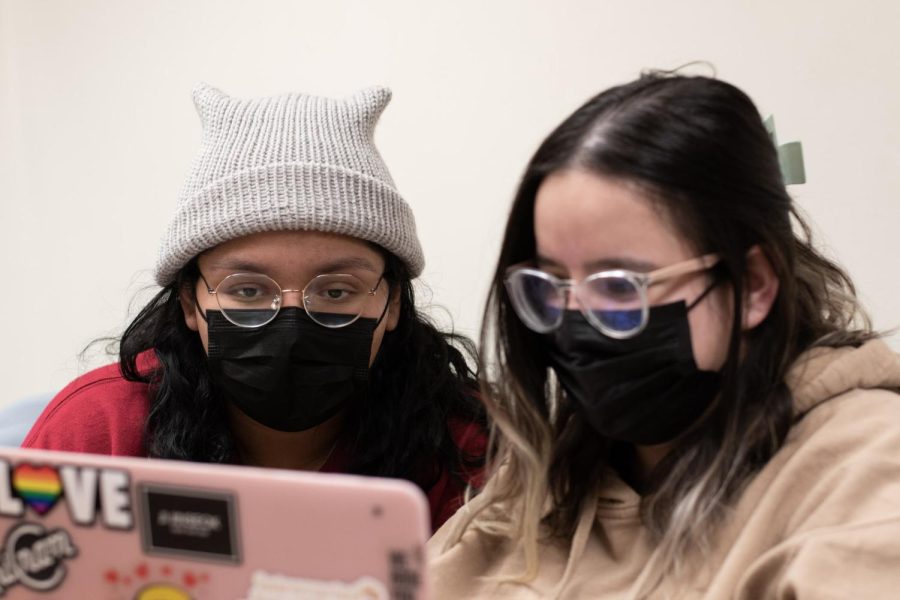Will masks stick around in our post-pandemic world?
Even after Covid 19, we don’t use masks to protect others.
Two students studying together, wearing masks.
February 27, 2023
Every year, students come down with “the sniffles,” turning the classroom into a symphony of deep inhales and swallowing mucus. To some, it is like white noise; to others, it is the most infuriating sound that makes them want to shout, “Can you just blow your nose already?”
I wore a mask eight hours a day while working at Trader Joe’s during the pandemic. Although it was not particularly comfortable, it was manageable. It felt like tolerance, the more you did it the easier it became.
There is more to this year though, as it is the first winter that is largely unmasked since the winter of 2019. As we enter this new unmasked season, people are visibly falling ill quite frequently around campus.
In Pullman, we have largely returned to normal from the pandemic but should we completely forget about masks?
An article written by VOA News discusses how in some Asian countries it is customary to wear a mask in public when you are feeling unwell.
There are many reasons that folks wear surgical masks in these countries, some due to fashion or environmental reasons (bad air quality), but it is also customary to wear a mask in public when you are feeling sick as a courtesy to others.
This way of looking at illness does not show up out of thin air.
Many Asian countries have adopted mask-wearing courtesy when sick, but Japan, China and Taiwan have Implemented this social custom more than the rest. The major turning point for these countries was the SARS pandemic, which originated in southern China in Nov. 2002.
Although western countries have now experienced a full-fledged pandemic, we don’t seem to value this courtesy of wearing a mask when ill. This is not the most surprising fact considering that America is the place where one individual’s wants and needs can be placed above a social goal.
Don’t get me wrong, this can be an incredible thing. Our rights are unmatched and our freedoms are close to endless. Should we not be focusing on the health of the whole community over individual comfort?
I experienced the same head cold that most of the campus is. The coughing in class has been audible for several weeks. Barely anyone wears a mask anymore, and the ones who do seem to wear their masks through sickness and health.
However, my experience is not echoed by some people in my close circle, for them, it is so unbearable they can’t stop thinking about the discomfort. It’s itchy, hot, and uncomfortable. They feel like their breath is inhibited and they just can’t stand it.
This poses an interesting alternative. Could Americans adopt a more collectivist culture when it comes to issues such as illness?
A recent poll provided by the Washington Post seems to have an optimistic outlook on this thought.
More than a year ago, “Two-thirds of Americans say that once the coronavirus pandemic ends, they plan to put on masks when sick and wear comfortable clothes more often than before,” Washington Post wrote. However, according to The Atlantic as of October of 2022, this is not true.
According to lazer lab mask usage outside of the home has dropped to 29 percent in the U.S. since the early months of 2022.
Americans are generally thought of as a selfish society through the lens of other countries. There’s a reason a lot of American tourists prefer to claim Canadian status when traveling abroad.
“The first word that comes to mind when I hear the word America is ‘Arrogance.’ They are big and loud and they are in charge of everything.” – Christopher Darroch, 39, actor, Toronto told CBS.
CNN even wrote an article about how to pretend to be Canadian when going abroad in 2013.
Our culture sets us up for an individualized view of the world and therefore makes Americans more likely to focus on the sacrifice mask-wearing would cause them rather than intentionally making that effort for others.
This isn’t completely on the backs of college students though. While we don’t see a lot of mask wearers from sick individuals we also don’t see a lot of professors who trust students. If you become ill, you generally have two choices:
You can not go to class and keep classmates healthy while sacrificing your grades. Your professor may or may not do anything to help you, but either way you likely fall behind.
Or you can go to class and risk the health of others around you while prioritizing your schooling above self-care. Maybe you have some masks left over and you decide to wear them to protect your classmates, but maybe you don’t.
Regardless, you are tired, worn out and prolong your sickness due to an overworked mind and body. At least others will consider you ambitious and hard-working while you work yourself to death. The least you can do is spare your classmates from that same fate by wearing a small covering on your face.










